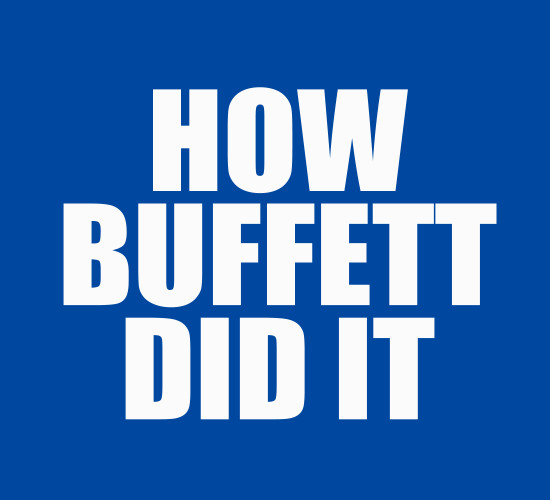Welcome back!
We left off on the importance of practicing humility in order to become better at rational thinking, the very skill that Warren Buffett said was key to his success!
Before we get into the second component of rational thinking, I want to revisit the first component – humility.
There’s a reason I listed humility as the first component – If you’re not humble enough to admit that your ideologies may be flawed, then the second component of rational thinking,practicing self-reflection, simply won’t work for you.
So, if you breezed thru part one of this essay covering humility, I would encourage you to go back and re-read it with a more open mind. As I said in the first part, the bank balance doesn’t lie. If you’re not where you want to be financially, something about your thinking is causing you to get in our own way. Isn’t it time to be humble enough to admit that, so that you can move past it? Remember, even Charlie Munger and Warrren Buffett experience some sense of the importance of intellectual humility. If we do not come to value knowledge of our own ignorance, we will not be motivated to gain that “knowledge.”
And now onto self-reflection.
To practice self-reflection, our values must begin to shift. The rational thinker must find themselves developing some confidence in reason. In other words, they must become persuaded that developing the skill in reasoning is crucial to solving their problems, and that they are capable of developing that skill.
And the first step is to take an inventory of your beliefs, via self-reflection. Before we get there, let me ask you a question. Have you ever thought about where your beliefs come from?
As much as we would all like to believe that our thoughts are our own, our major beliefs and ideologies are typically inherited from our parents or from our environment. It is just dogma we accepted without reflecting upon why we accepted it.
Now, don’t beat yourself up here. As children, we are taught to obey and respect our parents, so that’s what we did. There was no advantage to disagreeing with our parents and there certainly were disadvantages to disagreeing, so it should be no surprise that adult children have roughly the same beliefs about money, race, religion and politics as their parents.
The problem is that ideologies are like tunnels. These tunnels keep us isolated from understanding or acceptance of other ideologies that might differ from our own. That might be better for us. We simply accept our ideologies and dismiss any other ideologies that contradict them. Thus, our ideologies, when unchallenged, stunt our growth.
Now back to inventorying our thoughts…
The art of self-reflection begins by asking ourselves these very important questions:
- Is what I believe really true? Note: For something to be really true, it means that it’s true for everyone in every circumstance. For example, some believe that it’s not possible for a young African American woman to lift herself out of a life of poverty and abuse and onto uncommon success…. but someone did. Thank you Oprah Winfrey. If you think your financial situation is unique and it’s the reason you haven’t excelled, you’re not thinking rationally. You’re lying to yourself. It’s just not true. And the reason it’s not true is that thousands of people have built wealth after first being disadvantaged in some way or another. And if they can do it, that makes the “belief” that others cannot completely false. Have you tested your beliefs lately to see if they are really true?
- Is what I believe really serving me? Let’s say that you’re not ready to admit that some of your beliefs may actually be untrue, know this – it’s not hard to see if your beliefs are serving you or not. That’s because of this – where you are in life is the fruit of your beliefs. It’s the giant scoreboard of your life. Believe that money is the root of all evil? If so, the scoreboard will show that you’re struggling financially. Believe that you don’t have time to learn how to invest? The scoreboard will agree with you. Believe that it’s impossible to build wealth on a middle-class income with three kids to feed and clothe? Guess what, that’s exactly what the scoreboard will show as well. Please know this – there are no “idle” beliefs. Our beliefs either serve us well or they are of a disservice to us. If you are whipping that same horse over and over only to finish near the back of the pack financially every year, your beliefs aren’t serving you. What beliefs do you have about money, maybe that you’ve carried around for years, that are actually harming you?
If you went thru those two steps in an intellectually honest way, you should have a list of beliefs that aren’t true and/or that don’t serve you well. This, my friends, is an inventory of your non-rational beliefs. These keep you from thinking rationally.
What to do with them?
Take a virtual sword to them today. Cut those beliefs away, like a rope to an anchor that is holding a ship back. Don’t wait until you come up with better beliefs. You must first create the space for a better belief to occupy, so just burn those bridges now. If you don’t, they’ll just be there again and again to trip you up, to “get in your own way”, as Buffett says. So, wave goodbye to them…
Goodbye to the belief that poor people cannot become rich!
Goodbye to the belief that saving money is just too hard right now!
Goodbye to the belief that nobody in your family has ever built wealth!
Goodbye to the belief that only the “lucky” succeed in life!
When you do this, you’ll begin to ask yourself “fundamental” questions about the character and nature of your life. Here’s a question: If someone were to follow you around for a year and knew absolutely everything that you were thinking, feeling, and doing, what would that person say are your fundamental values and beliefs? To what extent would that person conclude that you unconsciously conform to independent, rational thinking or that you conform to group-imposed values? Hint: If you have a mediocre bank balance and your finances are about the same or lower as the group of people you most associate with – friends, family and co-workers – then you most likely are conforming to group-imposed beliefs.
The art of rational thinking is to think independently. It takes intellectual courage to do this. To say to yourself, “My beliefs haven’t been serving me well. I’m tired of struggling. I’m going to think differently going forward. I’m going to think opposite of the beliefs I’ve been carrying around because they’re just not working for me.”
Try this: Whenever you have a financial problem, a problem that you need to think seriously about, take the time to analyze the elements of thinking through the problem. Figure out your purpose for addressing the problem (be precise). Write out, clearly, the exact question you are trying to answer. Write down the information you need to address the problem in a rational way. Do you have that information? Where can you get it?
Restrain yourself from jumping to a conclusion. Identify the main assumptions you are making. Analyze and evaluate those assumptions. Focus on the key concepts you are using in your thinking. Explicitly state the point of view from which you are approaching the problem. Consider some alternative points of view. Examine the possible consequences that might follow if you make this or that decision. Check to see if you are considering all the plausible alternative possible decisions.
And here’s a pro tip for thinking rationally: Think of alternative ways that someone you consider a reasonable person might interpret that information. What would Warren Buffett do? Would he rely on some tired old dogma handed down for generations, that never made any sense anyway? That clearly haven’t served the people handing it down?
No.
He would think rationally about it. That’s what’s made him the success he is today. That same skill will also make you a success in life.
Be free. Nothing else is worth it.
P.S. Are you missing out on what tens of thousands are getting in their mailbox? Sign up on my email list and there will be lots of extra stuff about building wealth that you will receive in the future if you do!
P.S.S. What’s this got to do with you? If you don’t take action, absolutely nothing. But remember this – most people fail to achieve what they want in life simply because they never start. If you’re ready to escape the rat race and live life on your terms, don’t wait. There’s nothing for sale on this blog. I just provide actionable advice for free. What do you have to lose? Start today.
Ready for more tips on how to achieve the free life? Check-out more articles from the blog archives below:
No, The Problem Is Not That You Don’t Have The Time. Never Has Been. The Problem Is Inside You.
Are You Ignoring The Right Things? What Not To Pay Attention To, If You Want To Be Financially Free








